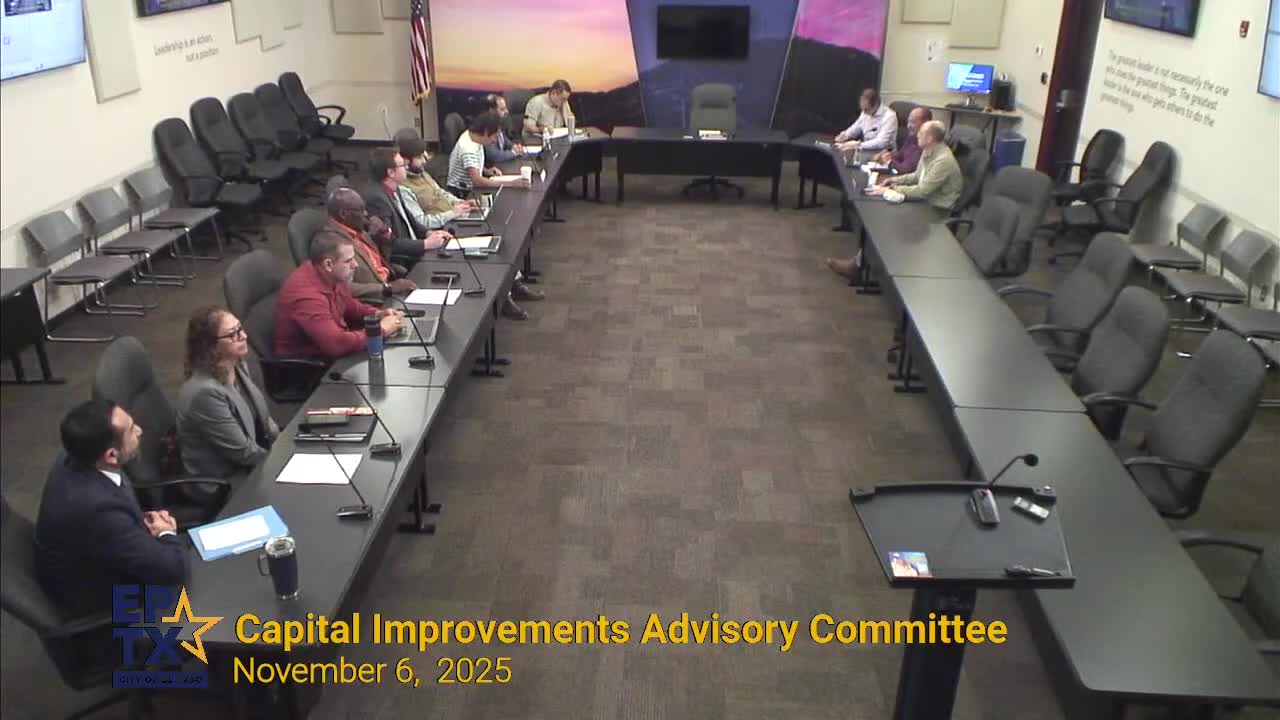Capital Improvements Advisory Committee approves El Paso Water's semiannual impact-fee report; staff to implement SB14 credit process
Get AI-powered insights, summaries, and transcripts
Subscribe
Summary
The Capital Improvements Advisory Committee voted to file El Paso Water's semiannual report on impact fees for March 1'Aug. 31, 2025, after staff outlined collections, capital spending and plans to implement developer credits required by state law.
The Capital Improvements Advisory Committee voted to file El Paso Water's semiannual report on impact fees for the period March 1 through Aug. 31, 2025, after a staff presentation outlining collections, capital spending and next steps to implement state-required credits.
Gustavo Hurtado, fiscal operations manager for El Paso Water, told the committee the report is required semiannually and summarized activity in the utility's impact-fee service areas. "This report covers from 03/01/2025 through 08/31/2025," Hurtado said, and noted the utility assesses fees in developing portions of the city (West Side, Northeast and East).
The report shows El Paso Water has a water CIP budget of about $521.7 million with $137 million spent to date and an approximately $727 million wastewater CIP with $134.3 million spent to date. Hurtado said the utility spent about $30.5 million during the six-month reporting period, including roughly $22.3 million on the Pure Water Center. The Franklin East transmission main has a budget of about $37 million with $12.8 million spent so far, and the Bustamante wastewater treatment plant accounted for most of the recent wastewater spending increase.
Hurtado said impact-fee collections in the reporting period were higher than the previous six months: El Paso Water collected about $1.8 million from March through August, compared with about $584,000 in the prior reporting period. He said the East Side represented the largest share of collections for the period.
Committee members asked detailed questions about how subdivisions and pending applications factor into forecasting and when impact fees are actually assessed. Kevin Smith of Planning Inspections explained that impact fees are assessed at the time a builder requests building permits and service connections, and that land-use assumptions and developer timing feed the utility's forecasts. "When they do come in to be developed, they come in to request for building permits hookups to the water and wastewater systems. That's when the impact fee will be assessed to them," Smith said.
The committee discussed Senate Bill 14, which requires political subdivisions to provide a credit against water and wastewater impact fees for developers who construct or dedicate eligible systems that result in water reuse, conservation or savings. "It says [a political subdivision] must provide a credit against water and wastewater impact fees for the construction, contribution or dedication of an eligible facility, system or product that would result in water reuse, conservation or savings," Hurtado read from the legislation. Staff said the bill is generic about implementation and requires a fair and equitable process; El Paso Water is working with consultants and reviewing other cities' approaches to develop local criteria.
Renata Aranova, planning and development staff with El Paso Water, said El Paso already has many conservation measures in place and that identifying appropriate local criteria is more complicated here than in other parts of the state. "We're currently...working on figuring out the process or the mechanism of how we would give developers this credit," she said. Jeff Tepzik, El Paso Water chief financial officer, said the utility's prior fee update had been set lower than consultant recommendations and that developers will weigh the cost of implementing conservation measures against the fee credit. "Is it really cost effective? Am I gonna spend $5,000 to save $200 on an impact fee?" Tepzik asked rhetorically.
Staff told the committee the state rule is effective Jan. 1, but said it is unlikely El Paso will meet that effective date; staff expect any local rule to be retroactive once adopted. The committee asked staff to return with a proposed implementation process and calculation methodology.
After discussion, the committee approved a motion to file the semiannual report. The filing is required under Chapter 395 of the Local Government Code, staff said. The motion carried by voice vote.
The committee also completed routine business: it confirmed Dwayne Murphy as chair and David Marino as vice chair by voice votes, approved a proposed 2026 meeting schedule (proposed April 9 and Nov. 5), approved the minutes of the April 10, 2025 meeting and adjourned.
Votes at a glance: the committee acted on the semiannual filing and several administrative items by voice votes; no formal roll-call tallies were recorded in the minutes.
